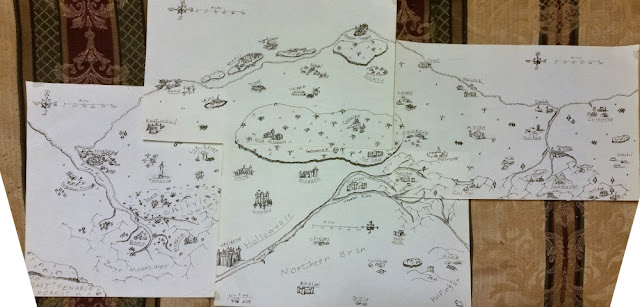 |
| Deadlands requires 4 letter size (8"x11") papers to show. |
The encounter is intended to happen in the Haunted temple—located at the most northern point of map. There they [the party] are to reclaim the temple. Doing so will increase the power of their patron Charon the God of Death. In a short 5 page document I made for the party to keep track of new information they learned, I made a throw away superstition of an evil peddler who stalked the roads [final page].
What their characters learned between sessions.
For the haunted temple encounter, I gave form to that lore superstition. In my game, the god of death is a betrayed god of Life/Resurrection; the betrayal made him a death god. I had decided to make the Foul Peddler the Slavon [living member of the Deadlands] trickster god. I had no intention of telling my players that fact, but it helped give a foundation to build the encounter.
Essentially the Foul Peddler is an Avatar of the trickster god Gazember. I made it an avatar incase the party attacks him. God's can't be beaten, not by 7–8 level characters; and avatar is another matter. The avatar would be powerful but much weaker, a puppet the god makes and inhabits. This way Gazember can perform his usual tricks and interactions in the world while not needing a champion or other disciples. Such a loophole seemed appropriate for a trickster god to use, as I don't have the various gods of Akura [the world my players are in] interact directly.
The encounter itself is capable of performing in an social or combat interaction. Being a trickster, the peddler likes games. Being a god, the peddler doesn't care how dangerous said games are. The card game is simple, the peddler's deck is like normal D&D's Deck of Many Things, just not as powerful. For those of you who don't know, the deck of many things is an item where the player draws from a prop deck/rolls on a table for a card. Some cards will give great benefits like a free wish [a spell that alters reality] others are negative like losing all your items, property, and gold. The Peddler's deck is a less severe version, but still annoying.
Now, the game isn't to pull from the deck. The game is to sacrifice something of value "[Soul of a Loved One]" is just an example. By sacrificing, the party member can transfer the card over to another party member. This mechanic is meant to turn party members against each other, or sacrifice to give a party member one of the positive cards.
Once the party is done transferring cards between each other, the one with the most amount of cards gets to transfer all negative effects to another member without needing to sacrifice something. It is another mechanic meant to turn the party against itself. A party member who was betrayed by another by receiving numerous cards now has a free means to retaliate. If they don't retaliate, then they are dropped to the beginning experience points of whatever level they are.
The final offer is that if a player doesn't like the outcome they can avoid the cards' effects by doing a small favor. The favor is intended to be that they carry a small card, which I made a prop for, that has runes meant to summon the trickster's avatar into another plane. The party won't know its true effects, but the trickster god knows the party will eventually need to enter the Feywild [D&D fairy realm dimension]. My secret lore on the god's avatar is that it can only be created in one plane of existence, the card creates said avatar. Summoning Gazember into the Feywild would of course upset the fairy folk greatly too.
The above was the social interaction. The combat encounter, as my players are just as likely to get mad and attack the peddler, is unique. First the avatar would use darkness to obscure the battlefield and then use its Divine Eyes trait, which is a reskinned form of the Warlock class' Devil's Eye eldritch invocation. The peddler also has several abilities that can be used outside normal round combat to create a sense of randomness and confusion amongst the party.
Most importantly is how I intend the peddler to act sporadically: constantly shifting across the battlefield, moving up walls, casting darkness spells, doing small cuts to the players, reviving the players if they are near death, and the like. The whole premise is that the players are there to amuse the Foul Peddler. If the players are beaten, he'll offer them the aforementioned small favor. If the peddler is beaten, he'll decay into dust and rags. All of value left behind would be a small prop card, which can never be lost or thrown away. Essentially the players would end up doing the small favor anyway.
Encounter itself
Hopefully you enjoyed the post. Feel free to borrow ideas from this encounter to enhance your own.
Have a good week.
No comments:
Post a Comment
Thanks for commenting.